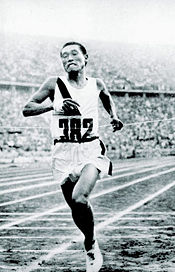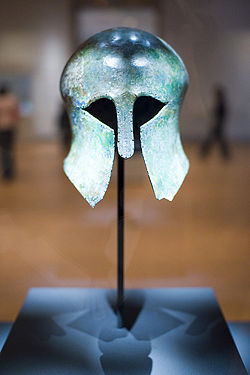Difference between revisions of "Sohn Kee-chung" - New World Encyclopedia
({{Contracted}}) |
|||
| Line 1: | Line 1: | ||
| − | {{claimed}}{{started}}{{Ready}} | + | {{claimed}}{{started}}{{Contracted}}{{Ready}} |
{{Korean name|[[Son (Korean name)|Sohn]]}} | {{Korean name|[[Son (Korean name)|Sohn]]}} | ||
{{MedalTopPic|KC Sohn.jpg|175px}} | {{MedalTopPic|KC Sohn.jpg|175px}} | ||
Revision as of 16:48, 18 December 2007
- This is a Korean name; the family name is Sohn.
| Olympic medalist | |||
 Sohn Kee-chung | |||
| Medal record | |||
| Men's Athletics | |||
|---|---|---|---|
| Gold | 1936 Berlin | Marathon | |
Sohn soon pulled away and won by more than two minutes. Nam finished third behind Harper. At the medal ceremony Sohn and Nam were forced to endure the humiliation of having their victory celebrated by the raising of the Japanese flag and by the playing of the Japanese national anthem. They registered a silent protest by bowing their heads, as can be seen in the photo of the event. Back in Korea, Sohn was a national hero.
He participated in the 1936 Summer Olympics in the marathon event and finished 42.195 kilometers in 2:29:19.2. The previous champion Juan Carlos Zabala, who took the lead, followed by Sohn and Ernie Harper of the UK. They ran together and passed Zabala after the 28 km point. Sohn pulled ahead and defeated
He broke the olympic best and received the gold medal, with his Korean teammate Nam Sung-Yong finishing third to win the bronze. A Britisher finished second.
Sohn spent the remainder of his career coaching other notable runners such as:
- Suh Yun-Bok, the winner of the Boston Marathon in 1947, who broke his world record with a time of 2:25:39.
- Ham Kee-Yong, winner of the Boston Marathon in 1950
- Hwang Young-Cho, gold medalist in the 1992 Summer Olympics marathon — At the age of 80 Sohn traveled to Barcelona to see him run.
At the 1988 Summer Olympics in his home country of South Korea, Sohn Kee-chung was given the honor of carrying the Olympic torch into the stadium at the opening ceremony.
He authored an autobiography entitled My Motherland and Marathon (Han-geul: 나의조국과 마라톤).
He was honored with the Order of Civil Merit (Han-geul: 국민훈장) and posthumously, Grand Cordon (Blue Dragon) of the Order of Sporting Merit.
Sohn Kee-Chung died at the age of 90 at midnight on November 15 2002 from pneumonia, and was buried at the Daejeon National Cemetery. He lived long enough to witness the 2002 FIFA World Cup Korea/Japan.
Nationality issue in 1936
At the time of the Berlin Olympics in 1936, Korea was occupied by Japan as a de facto colony. Sohn Kee-Chung had no choice but to compete for the Japanese team under the name "Son Kitei", the Japanese pronunciation of the hanja making up his name. Japanese policy in Korea./ As a nationalist, Sohn Kee-Chung refused to sign his name in Japanese and signed only his Korean name, and would even sketch the shape of Korea beside his signatures. When interviewered he would clarify that Korea was his mother country.
At the medal ceremony, Sohn was overcome with sorrow and shed tears to see the flag of Japan raised and the Japanese national anthem played. Japan was officially credited with Sohn's gold and Nam's bronze in its 1936 Summer Olympics medal count.[1]
Sohn returned to Korea a hero. The Dong-a Ilbo newspaper published a wire photo of Sohn at the medal ceremony with the image altered to remove the Japanese flag from his uniform. It so enraged the Japanese regime that it imprisoned eight Dong-a members and suspended the publication's operations for nine months.
In 1970 a South Korean Parliamentarian defaced the word "Japan" from a plaque honoring Sohn Kee-chung in Berlin, and replaced it with “South Korea”; the original name was re-engraved after consultation with the IOC.[2] Sohn was the flag bearer for Korea at the 1948 Olympics in London and the final torch runner, entering the Olympic Stadium in the 1988 Olympics in Seoul. The Dominican Republic (1956), Haiti (1969), South Korea (1992) and St. Vincent (1994) honored Sohn on stamps and by postmarks.
Sohn's Ancient Greek Helmet
Just prior to the IXth Olympiad in Berlin, the Greek newspaper Vradiny which has always been (still is) closely associated with sports sent the Olympic Organizing Committee an ancient Greek helmet to be awarded to the marathon winner. The Olympic Committee, in line with its rules that competitors must be strictly amateur and receive no remuneration for their performances, did not award the helmet to Sohn; instead it was donated to the Antikmuseum in Berlin and stayed well protected for 50 years. It finally came into Sohn's hands when Willi Daume, IOC member and then-president of the (FRG) German Olympic Committee, warmly presented it to him at a special reception in West Berlin on 10 August 1986, in the original spirit[3] Sohn was 74.
The helmet is of the early Corinth style — cheek and nose guards — 21.5 cm high, made in the 6th Century B.C.E. during the heyday of ancient Greek olympics. It was discovered at Olympia by German archaeologist Ernst Curtius in 1875. On 7 March 1987 it became Korean National Treasure No. 904; Sohn donated it to the National Museum of Korea.
Replicas of the helmet were awarded to the winners of 10 km, half marathon, and full marathon of the 2006 Sohn Ki-Jeong Marathon.
Attributed Quotes
"The human body can only do so much. Then the heart and spirit must take over."
Notes
- ↑ Sohn's win put Japan medal count at 6 gold (and 4 silver), and Nam's third place finish made 8 bronze, for an overall eighth place among nations. The Netherlands had 6 gold, 4 silver and 7 bronze, thus counting barely fewer than Japan and placing ninth. Great Britain placed tenth with 4 golds, 7 silver and 3 bronze.
- ↑ Manfred Bergman, Head of Section, FIPO, "Olympic Philately: The Marathonians 1920–1936 (2)", Magazine of the World Olympians Association, Issue No. 14, December 2004. [1] (Retrieved 18 December 2007).
- ↑ Daume told the whole story, published in PDF on the website of the LA84 Foundation, a charitable foundation endowed with funds from the 1984 Olympics in Los Angeles
See also
- List of people of Korean descent
External links
The LA84 Foundation story of Sohn Kee-chung's ancient greek helmet
| |||||
| Records | ||
|---|---|---|
| Preceded by: |
Men's Marathon World Record Holder November 3, 1935 – April 19, 1947 |
Succeeded by: |
Credits
New World Encyclopedia writers and editors rewrote and completed the Wikipedia article in accordance with New World Encyclopedia standards. This article abides by terms of the Creative Commons CC-by-sa 3.0 License (CC-by-sa), which may be used and disseminated with proper attribution. Credit is due under the terms of this license that can reference both the New World Encyclopedia contributors and the selfless volunteer contributors of the Wikimedia Foundation. To cite this article click here for a list of acceptable citing formats.The history of earlier contributions by wikipedians is accessible to researchers here:
The history of this article since it was imported to New World Encyclopedia:
Note: Some restrictions may apply to use of individual images which are separately licensed.
